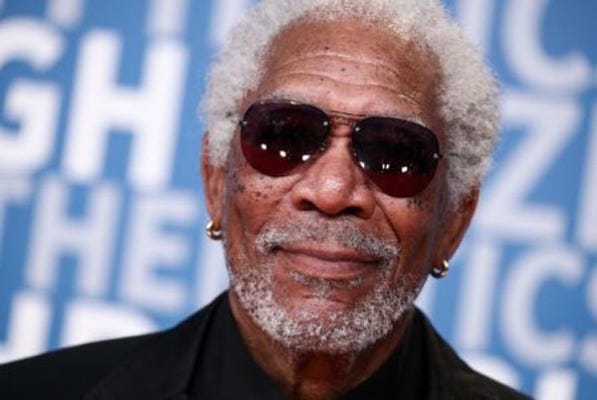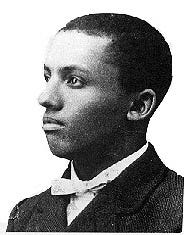It's Time To Retire Black History Month
Responding to a Rebuttal to Morgan Freeman's Spicy Opinions

Speaking in front of the class is the only thing worse than being picked on in school.
At least, for me.
Years ago, my 6th-grade class kicked off Black History Month with first-person presentations as black Americans of our choosing, summarizing their lives, challenges, and achievements.
I know that’s cultural appropriation now, but that was the assignment.
Anyway, I did Bo Jackson.
The man dominated pro baseball and football.
But to the surprise of the sports world, he retired early to spend time with family.
The rest of the month featured more interactive activities, droning PBS documentaries, and various reading assignments from our school’s porn-free library.
It was a different time.
But that’s 1990s midwest American public school Black History Month in a nutshell.
Unfortunately, as an adult, I see politicians, academics, and corporate leaders exploit the annual recognition to push woke ideologies for power and money.
And these days, these elitists only use Black History Month to veil their true intentions.
Black History History

First, let’s define what we’re talking about.
Black History Month originated as a week-long commemoration by historian Carter G. Woodson and the Association for the Study of Negro Life and History.
Organizers chose the second week of February as Frederick Douglas, and Abraham Lincoln shared the birth month.
Eventually, the week expanded, and in 1976, President Gerald Ford officially declared February as Black History Month.
Yet slowly but surely, more people took advantage of the federal holi-month.
And those that noticed were afraid to speak up for fear of being called a racist.
Cue Morgan Freeman
But the unpopular position entered the mainstream in 2005 after Morgan Freeman’s controversial interview with Mike Wallace during an episode of 60 Minutes.
Here’s a quick look at the highlights:
Still, many disagree with Mr. Freeman’s position as it makes its rounds every February on the internet.
And last week, I found a new response titled “Debunking Morgan Freeman on Black History Month” by Garrison Hayes.
A quick search shows Hayes creates historical and social content on TikTok and describes himself as an unofficial historian.
I heard the man out, and while he didn’t change my position, we agreed on some things.
One, of course, is that Morgan Freeman is a legendary actor.
Click below to see his two-minute rebuttal.
And no, you don’t need a TikTok account to watch:
 Tiktok failed to load.
Tiktok failed to load.Enable 3rd party cookies or use another browser
This isn’t designed to “dunk on” Hayes, as they say these days.
He was respectful with his argument, and we’ll do the same here.
Response 1: Relegation Vs. Celebration

“You’re gonna relegate my history to a month?” -Morgan Freeman.
Hayes said Freeman conflates ‘relegation’ and ‘celebration,’ suggesting that “Christians don’t consider Christmas ridiculous because it relegates Jesus to December.”
But Christians celebrate Christmas for a specific event, the birth of Christ.
At least, traditionally. Now, companies use the holiday season in general to make money.
And yes, whether Jesus was born on December 25th is debated to this day.
Still, Christmas is universally accepted as an observation of an individual birth, whereas the modern Black History Month is an arbitrary month representing countless events and people.
Well, it’s not entirely arbitrary, if you recall.
The founders selected February because of Abraham Lincoln and Frederick Douglas’ birthdays.
So I guess one could argue Black History Month is 50% rooted in white supremacy and 100% based on the patriarchy.
There ya go, Daily Beast. There’s your next article.
Anyway, when we seemingly honor all black people for everything, it dilutes meaning.
Like participation trophies.
I’d guess most Christians wouldn’t advocate for a Christian History Month to highlight the countless people that fought and died battling persecution over the centuries.
Even though there is a National Christian Day on March 12th, something I’d never heard of until I looked for it.
Response 2: Jewish History Month

Morgan Freeman asks Mike Wallace which month is Jewish History Month.
Wallace replies that there isn’t one and wouldn’t care for one.
Hayes responds, saying March is Irish-American Heritage Month, and Polish and German Americans celebrate their history in October.
But just because those months exist doesn’t mean anyone wanted them.
And let’s not pretend that St. Patrick’s Day and Oktoberfest serve little more purpose than to drive sales for bars, breweries, and whiskey companies.
Polish American History month was proclaimed in 1986, and Irish American Month in 1991.
But how many people know they exist?
Everyone knows February is Black History Month.
Hayes also said that Wallace was wrong when he said there wasn’t a Jewish History Month.
It’s May.
But this interview aired in 2005.
President George W. Bush wouldn’t officiate Jewish Heritage Month until 2006, so Mike was right when he made the statement.
Response 3: Morgan Freeman Doesnt Want a Black History Month

“I don’t want a Black History Month.” -Morgan Freeman
This one can’t really be debunked, as it’s Morgan Freeman’s personal opinion, as Hayes mentioned.
He adds that nobody should be forced to celebrate anything, as they shouldn’t, and it’s a minority opinion. (The ba dum-tss sound bite was appreciated.)
And he cites a poll that doesn’t directly back up his point, in my opinion.
According to Pew Research, the survey says blacks are more likely than other groups to see their race as central to their identity.
It didn’t ask whether they thought there should be a Black History Month.
For the sake of argument, I’d say that these respondents likely feel their skin color is central to their identity because society doesn’t let black people be individuals.
Any attempt to put their skin color aside, even if it’s second, usually results in someone calling them an Uncle Tom.
But I’m a white male, so what do I know?
Response 4: Black History is American History
This one’s easy, we all agree.
We must stop this obsession with race.
This is supposed to be a free country. Not a prison yard.
Response 5: Stop Talking About It

Mike Wallace asks Morgan Freeman how we’re supposed to eliminate racism if we don’t have Black History Month.
As if it does anything.
In response to Freeman, Hayes says ignoring race would be like suggesting that we could cure cancer if we stopped talking about it.
While racism is figuratively a social cancer, its learned behavior at its core.
Not a non-sentient biological disease.
I think Morgan Freeman meant we should stop prefacing everything with skin color.
Not ignoring actual discrimination.
Public schools tell white kids they and their ancestors are the bad guys, while the government and entertainment industry, full of role models, praise black kids for being black.
Then those white kids find their college and work options might be limited because of their skin color.
This breeds more racism and negates individualism.
Hayes concludes that point by saying, “We didn’t talk about racism for hundreds of years, and black people were still in chains.”
This is a weak analogy.
Countless people of all races talked about how skin color impacted society as they fought for freedom.
The conversation would be different than today, sure.
But it was undoubtedly a major social issue discussed behind closed doors until it became a public debate, which evolved into a war (other factors contributed to the war, I know) that resulted in the end of slavery.
Response 6: Don’t Call Me White

In his last point, Morgan Freeman says, “I’m going to stop calling you a white man, and I’m going to ask you to stop calling me a black man.”
Again, I think Freeman is saying we should stop labeling everything by race.
Knowing race is essential for missing persons or fugitive descriptions but not for representing the accounting department.
In response, Hayes says that if we stopped referring to each other based on skin color, white people would still own 10x the wealth and more property than anyone else.
This is a red herring.
Wealth distribution does not make an argument for making life about race.
But again, for argument:
Blacks comprise 13% of the population, with whites at 75%.
Naturally, whites will have more money, and we’re also more likely to get a DUI and perpetrate sexual violence.
Of course, some white families built wealth on slave labor.
But nobody wants to talk about the whites who fought as abolitionists or soldiers on the battlefield.
Or that in 1830, around 3,000 blacks owned about 12,000 black slaves. And held much more property than I’ll ever own.
And how about the blacks that made money by catching escaped slaves either by force or luring them to be kidnapped?
According to historian Kate Clifford Larson, regarding black bounty hunters:
“You could buy a farm for $400 and feed your family and live a good enough life. All you’d have to do was go out and capture one or two runaway slaves and you were set. They were very uncommon but they did exist, and it was a problem for the community.”
And nobody wants to talk about the differences in racial spending habits.
For example, blacks are more likely to spend money on luxury cars and jewelry, while whites are more likely to save their cash.
And we ignore that blacks are more likely to have sex at a younger age, increasing their chances of having children, which introduces more financial burdens and limits their ability to accumulate wealth.
A white supremacist would say these are inherent racial traits.
But they’re not. They’re a product of culture.
Time to Retire Black History Month

Years ago, schools used Black History Month to teach kids about our nation’s past and celebrate those who fought for true equality.
Not a fight to be better than anyone or to play the victim, but to be considered an equal.
Not anymore.
We’re supposed to learn history, so we don’t repeat it.
Yet here we are.
Corporations flaunt pictures and bios of black employees, like Pokemon cards.
Marketing departments focus on black people for profits, like brand mascots.
And politicians take advantage of black people for votes.
This week at the State of the Union, Joe Biden introduced Tyre Nichol’s family, who just buried their son last week, using their grief to play on emotions.
But Sleepy Joe couldn’t even be bothered to get the man’s name right, referring to Tyre as “Tyler” in a massive blunder, ending in a gasp heard around the world.
So while Black History Month did some good through the years, the dark side of human behavior took control, unfortunately.
Bo Jackson retired early, choosing family over money and fame.
And the only way for the black community to thrive is by changing family, community, and culture.
No amount of HR hiring quotas, broken government promises, or anti-racist ice cream will bring change.
It starts at home.
Bo Jackson knew that when he walked away.
And it’s time for Black History Month, and wokeness in general, to follow suit.
Just don’t crawl back like Tom Brady.





